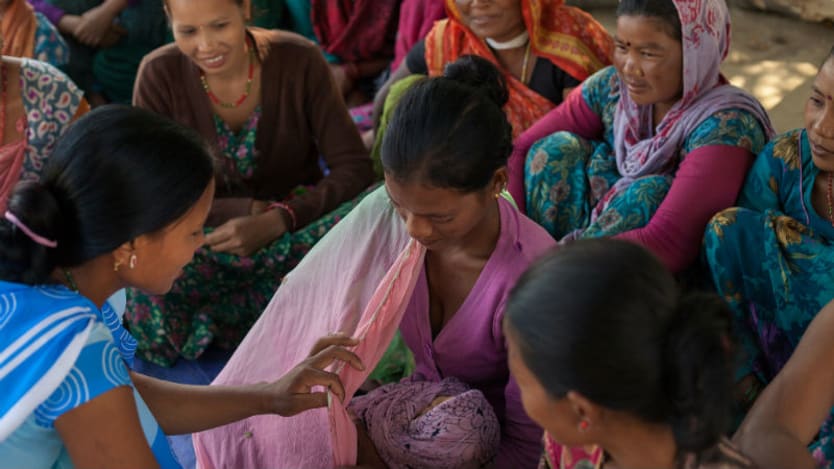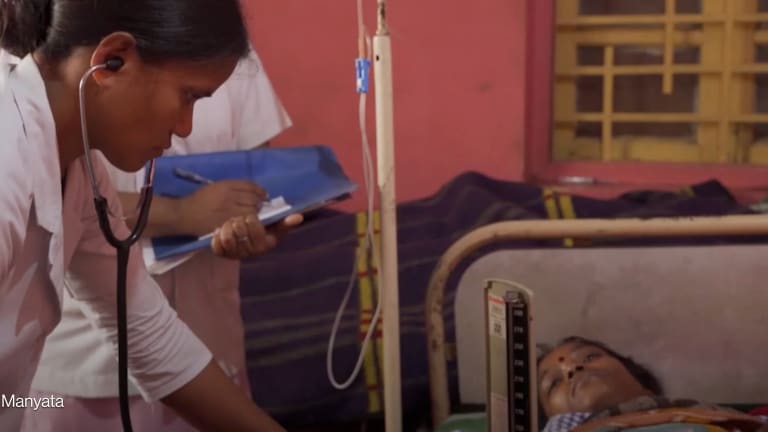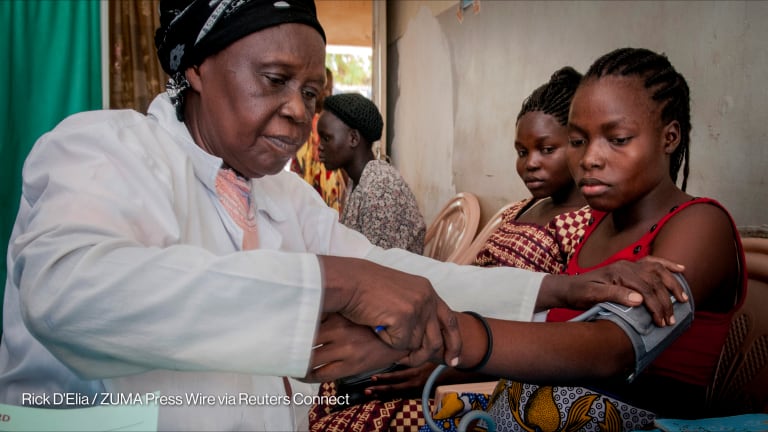Opinion: We must keep maternal health front and center of the UHC conversation

By H.E. Dr. Joyce Banda, former president of Malawi; H.E. Dr. Bineta Diop, African Union special envoy on women, peace, and security; Dr. Mary-Ann Etiebet, lead and executive director at MSD for Mothers; Pape Amadou Gaye, president and CEO at IntraHealth; Dr. Edna Adan Ismail, director and founder of the Edna Adan Maternity Hospital and former foreign minister of Somaliland; Dr. Mariam Claeson, director of the Global Financing Facility.
The Lancet recently reported that if high-quality health systems were in place in 137 low- and middle-income countries, maternal deaths would decline by half.
So, how do we get there? How do we ensure that every woman has access to quality health care before, during, and after childbirth; that she and her newborn are not made to suffer from a preventable and treatable maternal health complication; that she is given the best possible chance of surviving — and thriving in — motherhood?
Pregnant women in Nigeria are shunning medical centers. Here's why.
Nigeria has one of the highest maternal mortality rates in the world; a complicated relationship between traditional birth attendants and government means women are losing out on medical care.
This is a complex and urgent question. We stand at a critical inflection point in the fight to end preventable maternal mortality. More than 99 percent of maternal deaths occur in LMICs, with almost two-thirds in sub-Saharan Africa.
In Sierra Leone, it’s estimated that more than 1,300 women died for every 100,000 births in 2015 — more than six times the global average; a woman in Chad faces a 1 in 18 lifetime risk of dying from complications during pregnancy or childbirth — the 44 percent decline in global maternal mortality between 1990 and 2015 was significant, but insufficient.
According to a new analysis of health-related Sustainable Development Goals, based on the pace of progress across countries from 1990-2017, it is projected that we will not even come close to reaching the SDG 3.1.1 target of fewer than 70 maternal deaths per 100,000 live births. If things continue as they are, we will barely make it past the halfway point. We must seize all available opportunities to accelerate progress for women’s health as we push forward on the broader global goal of universal health coverage.
As leading advocates, we surfaced a few ideas on how to do this — a set of guiding principles and priorities based on our different experiences and lessons learned on the ground through our maternal health initiatives:
• Define basic maternity and newborn care, and ensure underserved populations are aware of this foundational health care right. Countries will have to decide, and commit to through national policies, which services make up a basic package of care across reproductive, maternal, newborn, child and adolescent health, and nutrition, including wraparound services such as family planning. They must enlist the help of midwives and other health professionals to raise awareness within communities about the quality care citizens need, deserve, and have a right to demand.
• Remember that change begins at the grassroots level, working within existing social structures. We must engage traditional African leaders, and enlist them as fellow champions, leveraging their influence to change behavior and encourage safer practices — starting with more women delivering at a health facility with a skilled birth attendant. Regional authorities, such as the African Union, can play a key coordinating role, facilitating cooperation between central governments and local authorities to support the implementation of key initiatives. Particular attention needs to be paid to countries affected by conflicts.
• Recognize the need for more trained frontline health care workers with the capacity and support to improve access to quality care. One of the fundamental issues around access to health services is a chronic shortage of skilled health workers, particularly in rural and other hard to reach areas. Of the 73 countries that account for 96 percent of all maternal deaths, there are very few countries that have an adequate workforce for offering basic and essential maternal care. One way we can address this is to actively recruit local talent — individuals already known and trusted by their communities — and provide training along with incentives to stay and work in underserved areas. We must look beyond doctors and midwives to a range of health professionals and consider how task-shifting can help improve quality wherever human resources are scarce, and to strengthen integrated community health systems that can deliver services for women, newborns, children, and adolescents.
• Engage the local private health sector as an important partner in addressing access and quality issues. The private health sector, for profit and not for profit, in many countries is significant in size and reach — roughly 40 percent of women in LMICs seek maternity care and family planning services from private providers — yet is often overlooked and excluded from quality improvement efforts. Countries must engage these local private providers –– doctors, nurses, midwives, drug shop owners, and community health workers — and find ways to integrate them into UHC strategies.
More on maternal health:
► Meet the women providing maternity care amid conflict
► Aid watchdog accuses DFID of exaggerating maternal health impacts
► A new public-private partnership drug stirs hope to curb maternal mortality
• Use pay for performance and other innovative financing approaches. To fill the enormous funding gaps in global health financing, we must support efforts to crowd in more private capital and channel investment more effectively. The Global Financing Facility is a useful mechanism for aligning stakeholders and donors behind a single investment case that is country-led and reflects country priorities and needs. GFF also offers an opportunity to try some innovative financing models to achieve both scale and sustainable financing for maternal and newborn survival across the reproductive, maternal, newborn, child and adolescent health, and nutrition continuum of care.
• Strengthen accountability. In Rwanda, everyone who works for the ministry of health signs a performance contract, district teams articulate a vision and set specific targets, and districts are ranked according to how well those targets are met. The approach has been widely credited with leading to significant and far-reaching improvements in maternal health and maternal health outcomes — including a 72 percent decline in Rwanda’s maternal mortality ratio between 2000-2015. Civil society can play a key accountability role in the delivery of family planning and quality maternal and newborn health services.
• Look outside the health system for answers. To effectively deliver services, better roads, more ambulances, and reliable electricity are required; along with the implementation of stricter rules protecting sexual and reproductive health and rights for all women and girls. Girls should be supported and empowered to stay in school and delay early pregnancy and marriage. Countries and systems that do not prioritize these things will have a tough time meeting SDG targets in maternal health and beyond.
An important starting point, and the key to all of this is to enable decision-making that is informed and responsive to local needs. And for this, we must invest in data. We need to count and understand, every maternal death so that we can begin to address the root causes. Countries that haven’t yet done so must follow through on their commitments to implement maternal death surveillance and response. There are big gaps in this regard in Africa, where according to WHO, only half of the nations have operational maternal death surveillance and response structures.
The Bellagio Declaration identified that this is the moment for a health system quality revolution. More than 8 million lives — and $6 trillion — could be saved annually if systems consistently provided high-quality care. By ensuring access to quality care for women — not just during pregnancy and childbirth but across their life course — we can promote the health, well-being, security, and future prosperity of their children, families, communities, and countries. This “mom effect” is why we must keep maternal health front and center of the UHC conversation.
Search for articles
Most Read
- 1
- 2
- 3
- 4
- 5








